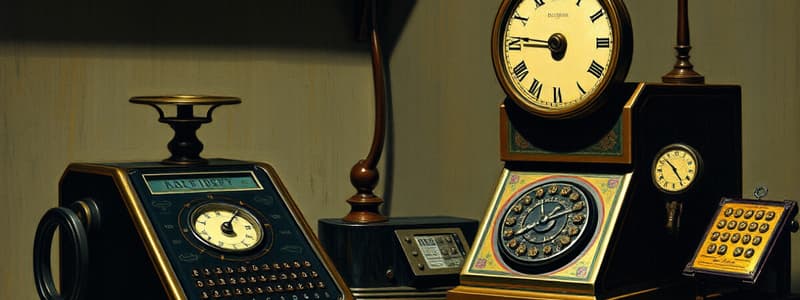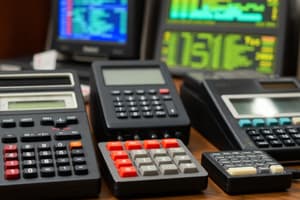Podcast
Questions and Answers
Who is often considered the 'father of the computer'?
Who is often considered the 'father of the computer'?
- Konrad Zuse
- Ada Lovelace
- Charles Babbage (correct)
- Gottfried Wilhelm Leibniz
What significant device did Blaise Pascal create in the 17th century?
What significant device did Blaise Pascal create in the 17th century?
- Pascaline (correct)
- Step Reckoner
- Analytical Engine
- Zuse Z3
Which computer is recognized as the first commercially available computer?
Which computer is recognized as the first commercially available computer?
- Zuse Z3
- IBM 701
- UNIVAC I (correct)
- ENIAC
What invention by Bell Labs in 1947 significantly changed computing technology?
What invention by Bell Labs in 1947 significantly changed computing technology?
Which computing device was programmable and developed in the 1930s?
Which computing device was programmable and developed in the 1930s?
What was a characteristic of the Analytical Engine designed by Charles Babbage?
What was a characteristic of the Analytical Engine designed by Charles Babbage?
Who is credited with writing the first algorithm intended for a machine?
Who is credited with writing the first algorithm intended for a machine?
Which processor is considered one of the first microprocessors introduced in the 1970s?
Which processor is considered one of the first microprocessors introduced in the 1970s?
Flashcards are hidden until you start studying
Study Notes
Early Concepts and Mechanical Calculators
- Ancient Tools: The abacus served as one of the earliest computation tools, utilized across ancient cultures like Mesopotamia and China.
- 17th Century Innovations: Blaise Pascal invented the Pascaline, a mechanical calculator for addition and subtraction; Gottfried Wilhelm Leibniz later created the Step Reckoner for multiplication and division.
The 19th Century: Theoretical Foundations
- Charles Babbage: Designed the Analytical Engine in the 1830s, which included components like an arithmetic logic unit, memory, and conditional branching, resembling modern computer architecture, though never completed.
- Ada Lovelace: Collaborated with Babbage, recognized as the first computer programmer for writing an algorithm intended for machine processing.
Early 20th Century: Electronic and Mechanical Advances
- Electromechanical Computers: Konrad Zuse developed the Z3 in the 1920s-1930s, a programmable computer using relays.
- 1940s Electronic Expansion:
- ENIAC: Completed in 1945, considered one of the first general-purpose electronic digital computers, capable of various calculations.
- UNIVAC I: Launched in 1951 as the first commercially available computer, primarily for business data processing.
The 1950s and 1960s: The Mainframe Era
- Mainframes: Dominated business and scientific calculations with powerful models like the IBM 701 and IBM 1401, catering to large-scale computing tasks.
- Transistor Revolution: Developed in 1947 by Bell Labs, transistors replaced vacuum tubes, making computers smaller, more reliable, and energy-efficient.
The 1970s and 1980s: Personal Computers and Microprocessors
- Introduction of Microprocessors: The 1970s marked the emergence of microprocessors, integral to modern computing; Intel’s 4004 debuted in 1971 as one of the first.
- Personal Computer Revolution:
- Apple II: Released in 1977, recognized as one of the first successful mass-produced microcomputers.
- IBM PC: Introduced in 1981, it established the personal computer standard, promoting widespread adoption in homes and businesses.
Studying That Suits You
Use AI to generate personalized quizzes and flashcards to suit your learning preferences.




